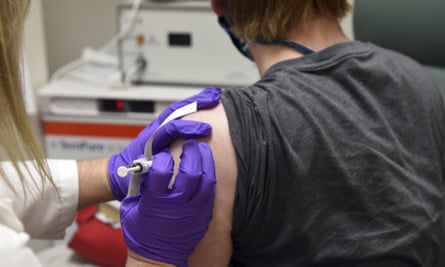UK researchers to deliberately infect participants with COVID-19 for vaccine trial

A woman getting a vaccine delivered.
October 22, 2020
Researchers in the Imperial College in London, U.K plan to intentionally expose 90 healthy young individuals with COVID-19. If it receives final regulatory and ethical approval the experiment is planned to begin in January in a London hospital. The first “human challenge trial” is aiming to accelerate the development of a vaccine that could end the pandemic.
The experiment will be conducted by a clinical-research organization based in Dublin, Open Orphan, and a subsidiary that runs challenge trials on respiratory pathogens hVIVO. It will take place in the high-level isolation unit of the Royal Free Hospital in north London.
The U.K. government’s COVID-19 Vaccine Taskforce has agreed to pay the company up to 10 million pounds or 13 million dollars to conduct the trial. The U.K. Medicines and Healthcare Regulatory Agency (MHRA), which regulates clinical trials in the United Kingdom, and an ethical review committee, still need to approve the initial trial and its design, and that of future studies.
The trials are open to only healthy adults aged 18–30. The test 30–50 participants. The process will be tested in which volunteers are given a vaccine and then intentionally exposed to this carefully calibrated dose of the virus. In order to determine the lowest dose of the virus that will reliably infect them the scientists will first deliver tiny doses of the virus by dripping the virus into their noses, without having been vaccinated. If not enough participants become infected, the scientists will try to expose these early-stage volunteers to a higher dose, repeating the process until they have identified the necessary exposure level of the virus. The goal is to identify a suitable dose of the virus SARS-CoV-2 to be used in future vaccines.
On a statement the Peter Openshaw, an immunologist at Imperial College London and investigator on the study said “Deliberately infecting volunteers with a known human pathogen is never undertaken lightly. However, such studies are enormously informative about a disease. It is really vital that we move as fast as possible towards getting effective vaccines and other treatments for COVID-19, and challenge studies have the potential to accelerate and de-risk the development of novel drugs and vaccines.”
If found the vaccine could be used to terminate the pandemic, but the prospect of deliberately infecting people with SARS-CoV-2, even those at low risk of severe disease is uncharted medical and biological territory. The experiment would be the first to expose humans to a deadly virus. Some have raised the questions about the safety and value of these studies. But the scientist of the COVID-19 challenge trials have argued that they can be run safely and ethically, and that their potential to quickly identify effective vaccines outweighs the low risks to participants.
